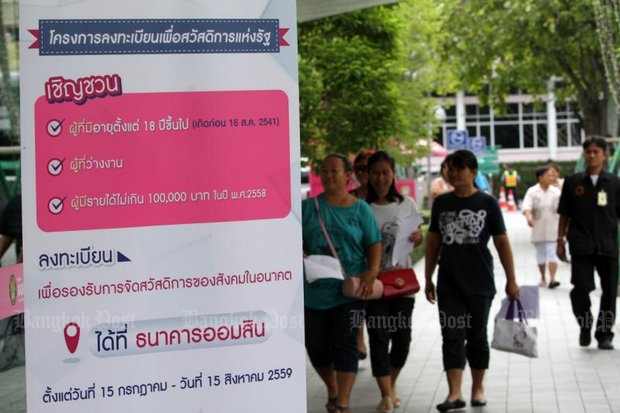
The Prayut Chan-o-cha government has made another attempt to tackle poverty. It has announced a plan to register more low-income Thais for the "Government Welfare Registration Programme", which was first put in place last year to use as a database for disbursing one-time cash grants at the end of last year.
As an incentive, the government has vowed to give free rides on the BTS and MRT, free electricity and water below certain usage levels and perhaps free accident insurance as well. Those who already registered last year are required to re-register and provide more personal information to the government.
Anyone who has observed Thai politics for long enough will know that this is not the first attempt by a Thai government to create what is known as a "database of poor people". In the early 2000s, then prime minister Thaksin Shinawatra also allowed "poor Thais" to register themselves. However, this latest attempt is different from Thaksin's one in that, this time round, there is a combination of political motivations by the junta government and the technocratic considerations of those in the Finance Ministry, as evidenced by their attempts to use various methods to screen out ineligible people from the database. There was no such attempt in the Thaksin era since it was purely driven by politics.
Having a good database about poor people can greatly help the government track and tackle poverty. This is particularly useful under the current trend of an overall government budget deficit which automatically rules out a universal approach to welfare and social protection for vulnerable Thais. The database would enable a badly needed effective poverty-targeting system. Wrong targeting would exclude the eligible, actual poor individuals, while including the ineligible who are not poor enough to receive support from the government.
This is all much easier said than done. Determining who the poor are is a difficult process in general and it is much harder for countries with large informal sectors such as Thailand. With the small number of taxpayers and large portions of the poor working and living in the informal sectors, the Thai government cannot track the incomes of poor people in the existing system. Also, incomes of people who work in the informal sectors are hard to calculate. For these two reasons, we, while admiring the efforts by the technocrats in the Finance Ministry, really doubt that the government can come up with a good database by way of self-reporting.
Yet, there is an alternative path to creating a good database of poor people. The first thing that the government should do is to combine many datasets, gathered by numerous government agencies, which include various categories of vulnerable Thais: small farmers with no land, the disabled, the ill, elderly without caregivers, orphans, single parents with low incomes and insecure jobs for example. Thus far, these datasets are scattered and no attempts have been made to synchronise and merge them. When this "good" database is produced, we can create a decent "poverty map" that would help the government to reach the poor much better than is the case currently. For one thing, the poverty map would help ensure that state budget is allocated more efficiently as it would know which areas have more poor people and need more support.
Second, the government should set up supplemental poverty criteria which consider factors that can be verified easily, much easier than trying to detect whether a person is telling the truth about his or her income. For example, the government can use housing conditions or the number of cars that a household owns in order to check their eligibility.
Third, the government should consider incorporating big data to create the poverty map. Using big data would reduce the costs of the surveys the government needs to conduct. Also, it would make the data more real-time. A study by the TDRI has shown that some data, such as mobile phone calls, have decent potential to contribute to the poverty map as they display a high correlation with poverty.
Fourth, how the government gives support to poor people is also important. In-kind benefits such as BRT and MRT free rides, for which the government is planning to use the database, would benefit only low-income dwellers in Bangkok. But our research has shown that poor people in different areas, such as in urban versus rural areas, experience different dimensions of poverty, and hence have different needs in order to overcome their own challenges. Giving cash to the poor would serve their purposes better. A second-best alternative is so-called "self-targeting" the poor, where the government provide free access to goods or services that low-income individuals would tend to use more than rich individuals. Obviously, free rides on the MRT and BTS do not fit this category, as they only incentivise more "non-poor" people to register on the system only to receive this benefit.
Most important of all, giving support does not guarantee that the lives of poor people will be better in the long run. If done carelessly we might fall into a "populism trap" once again, and the poor would be chronically dependent on the government for help. Instead, the government should aim to bring people out of poverty by inducing structural changes and enhancing opportunities to improve low-income individuals' conditions, the most important of which is to improve education access and equality for all.
Somchai Jitsuchon, PhD, is research director for inclusive development, Proudfong Chamornchan and Kantaphon Amornrat are researchers at the Thailand Development Research Institute (TDRI). Policy analyses from the TDRI appear in the Bangkok Post on alternate Wednesdays.